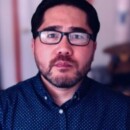Sequoia Nagamatsu
Fiction

- Biography
Biography
Sequoia Nagamatsu is the author of the national bestselling novel, How High We Go in the Dark (William Morrow, 2022), a New York Times Editors’ Choice, and the story collection, Where We Go When All We Were Is Gone (Black Lawrence Press, 2016), silver medal winner of the 2016 Foreword Reviews Indies Book of the Year Award. His work has appeared in publications such as Conjunctions, The Southern Review, ZYZZYVA, Tin House, Iowa Review, Lightspeed Magazine, and One World: A Global Anthology of Short Stories, and has been listed as notable in Best American Non-Required Reading and the Best Horror of the Year. He has previously taught at The College of Idaho, Southern Illinois University, and the Martha’s Vineyard Institute of Creative Writing. He currently teaches at St. Olaf College and resides in Minneapolis. He is at work on forthcoming novel, Girl Zero. More at http://SequoiaNagamatsu.com.
Mentor. Workshops and classes in fiction.
Statement: I believe my job as a writing teacher is to do three primary things: Serving as a supportive guide, helping you discover literature you may not have encountered on your own that will add to your literary toolkit, and helping you deconstruct the architecture of stories so that you might better unpack your own decisions. Whether you write domestic realism or speculative work or work that defies categorization, I place an emphasis on helping my students appreciate and understand not only the craft elements of stories but also the traditions particular stories come from—how place and race and history often converge to inspire and inform a creative work, pushing it beyond the sum of its parts. I view a classroom setting and one-on-one mentorship as a kind of community of empathy and exploration where we’ll ask questions like: What are the building blocks of this story? Who is the imagined audience? What might I want to emulate? Why am I resistant to a certain narrative? Why have I embraced this other narrative? How can this work that seems so different from what I want to do help me achieve my goals?
In both workshops and mentorship settings I again stress the concept of community not only as etiquette that should be practiced out of respect within an academic environment, but also as a practice of a working writer. Nobody truly writes alone and nobody publishes alone. In addition to conversations about writing, I place a focus on how we should all strive to support writers and the larger literary community outside of a classroom setting and how the work of good literary citizenship can enliven and inspire your own projects through new reading experiences, networks and friendships, and the simple truth that good writing, while worthwhile, is an incredibly hard undertaking that exists in concert with the realities of our everyday life. If you’re putting in the work, you’re a writer.



Social Media